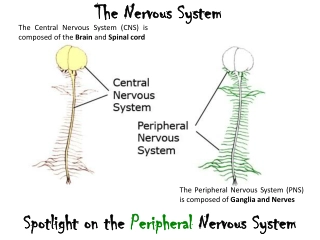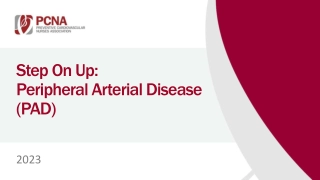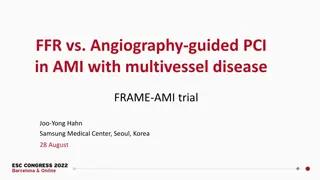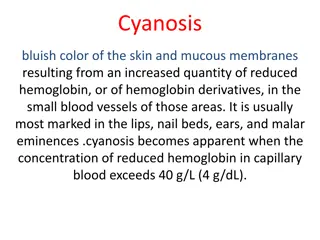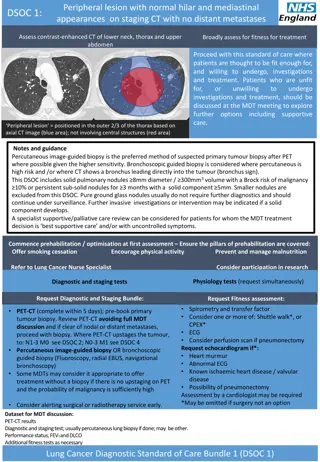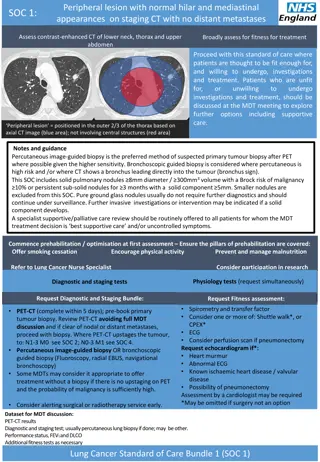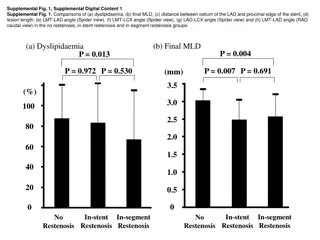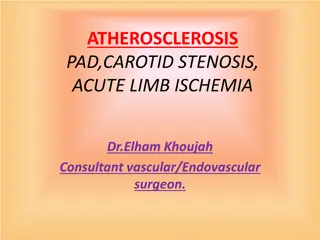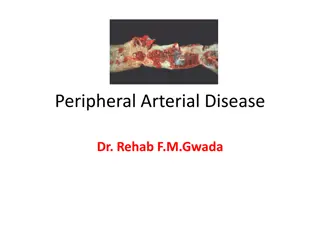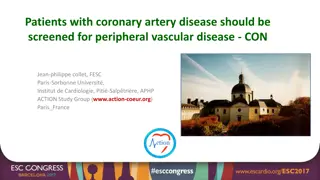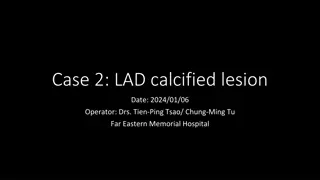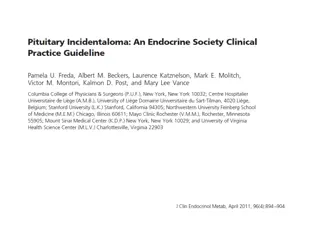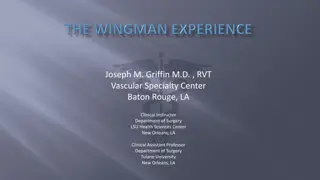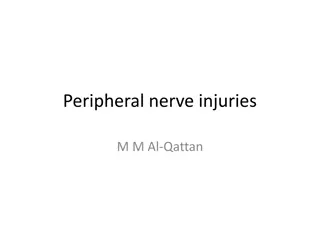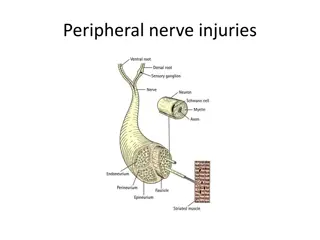The Nervous System
Central and peripheral nervous systems, as well as the somatic and autonomic nervous systems. It covers the components, functions, and control of each system, along with their effects on effector tissues.
0 views • 23 slides
Neurologic Disorder
Structural divisions of the central and peripheral nervous systems, learn about neuron anatomy, the neuromuscular junction, and the role of neurotransmitters. Includes information on Acetylcholine, Norepinephrine, Dopamine, and Serotonin.
0 views • 24 slides
Step On Up: Peripheral Arterial Disease (PAD)
Peripheral Arterial Disease (PAD), a condition caused by reduced blood flow in the legs or arms. Understand the symptoms, signs, importance of early detection, and who is at risk. Find out about the tests for PAD.
0 views • 18 slides
One of the Best service for Ear Wax Removal in Jordans
Gerrards Cross Skin Clinic serves the Best service for Ear Wax Removal in Jordans. They provide personalized solutions to address your specific needs. Their comprehensive treatment includes masseter treatment, anti-sweating treatment, skin boosters, SkinPen microneedling, dermaplaning facials, chemi
0 views • 6 slides
Best Laser Hair Removal in Mackay Harbour
Are you looking for the Best Laser Hair Removal in Mackay Harbour? Then contact Elesay. Their goal is to develop a deeper understanding of your skin and deliver results that provide long-lasting effects, allowing you to love the skin you're in for years to come. Their comprehensive range of services
0 views • 6 slides
Understanding Membrane Proteins and Cell Membrane Permeability
Cell membranes consist of phospholipid bilayers with embedded proteins, including integral and peripheral proteins. Integral proteins span the membrane, while peripheral proteins interact with the surface. Only non-polar molecules can pass through the membrane directly, while charged ions, polar mol
0 views • 30 slides
Comparison of FFR-guided PCI vs Angiography-guided PCI in AMI with Multivessel Disease: FRAME-AMI Trial
In patients with acute myocardial infarction (AMI) and multivessel coronary artery disease, this study aims to compare fractional flow reserve (FFR)-guided PCI with angiography-guided PCI for non-infarct-related artery lesions. The hypothesis is that selective PCI guided by FFR is superior to routin
2 views • 23 slides
Understanding Computer Peripheral Devices: Definition, Examples, and Types
Learn about computer peripheral devices, which enhance a computer system's functionality. Examples include mice, keyboards, monitors, printers, and scanners. These devices can be categorized into input, output, and storage devices, each serving a specific purpose to expand the capabilities of your c
2 views • 13 slides
Transcriptomic Changes in Peripheral Blood Mononuclear Cells of International Space Station Crew Members
The study analyzed transcriptomic changes in peripheral blood mononuclear cells of International Space Station crew members. Blood samples were collected before and after spaceflight, and differentially expressed genes were identified using RNA-seq analysis. Several genes, including CDKN1A (p21) and
0 views • 12 slides
Understanding Vagal Indigestion in Ruminants: Causes and Types
Vagal indigestion in ruminants is a functional disturbance affecting the fore stomachs, leading to symptoms like rumen distention, inappetence, bradycardia, and more. It is not a specific disease but a syndrome with various underlying causes such as injury, inflammation, or mechanical obstruction. T
1 views • 14 slides
Understanding Cyanosis: Causes, Types, and Clinical Differentiation
Cyanosis is characterized by a bluish discoloration of the skin and mucous membranes due to increased levels of reduced hemoglobin. This condition can be categorized as central or peripheral cyanosis, each with distinct characteristics and causes. Central cyanosis results from decreased oxygen satur
0 views • 13 slides
Standard of Care for Peripheral Lesion Assessment in Lung Cancer
The provided guidelines outline the standard care pathway for assessing peripheral lesions in lung cancer patients based on staging CT findings. It includes recommendations for biopsy methods, fitness assessment, PET-CT imaging, and considerations for treatment decisions. The protocol emphasizes tai
0 views • 5 slides
Psychometric Performance of PACADI Score in Pancreatic Cancer Patients
This study at IHPBA 2018 evaluated the psychometric performance of the Pancreatic Cancer Disease Impact (PACADI) score in patients with suspected pancreatic cancer. The research included 363 patients and assessed various aspects such as discriminative validity, test-retest reliability, and predictiv
0 views • 7 slides
Parathyroid Carcinoma Misdiagnosed as Thyroid Lesion: A Case Study
Parathyroid carcinoma (PC) is a rare malignancy often challenging to differentiate from benign thyroid nodules. This case study highlights a 50-year-old male patient whose nonfunctioning sporadic PC was initially misidentified as a follicular thyroid nodule. Despite preoperative evaluations, includi
4 views • 27 slides
Standard of Care for Peripheral Lesion Assessment with Normal Hilar and Mediastinal Appearances
Assessing patients with peripheral lesion on staging CT with normal hilar and mediastinal findings. Further investigation with contrast-enhanced CT is recommended for fitness evaluation and treatment planning. Biopsy methods, diagnostic criteria, and considerations for nodules and nodal staging are
4 views • 5 slides
Comparisons of Dyslipidaemia and Lesion Characteristics in Restenosis Groups
This supplemental content presents comparisons of dyslipidaemia, final minimal luminal diameter (MLD), distance between ostium of the LAD and proximal edge of the stent, lesion length, and various angle measurements in different restenosis groups. The findings highlight significant differences in dy
0 views • 4 slides
Complex Radiology Case: Multiple Traumatic Injuries in an Elderly Female
A 77-year-old female presented with multiple traumatic injuries after falling headfirst down stairs. Imaging revealed a comminuted inferior orbital wall fracture, facial lacerations, spinal fractures, and cervical cord syndrome. Lab findings indicated preexisting conditions like osteopenia, hyperten
0 views • 18 slides
Dermatological Conditions in Primary Healthcare: Overview and Treatment Principles
This comprehensive guide covers common dermatological conditions encountered in primary healthcare, including basic anatomy, diagnostic principles, lesion definitions, and treatment strategies. It emphasizes the importance of understanding the anatomy and physiology of the skin, diagnostic history,
0 views • 28 slides
Understanding Atherosclerosis, Peripheral Artery Disease, and Carotid Stenosis
This informative content details the histo-anatomy of blood vessels, pathophysiology of atherosclerosis, peripheral ischemia, and carotid artery disease. It covers the definition, risk factors, and processes involved in atherosclerosis, including endothelial cell function, blood flow dynamics, and f
3 views • 24 slides
Understanding Peripheral Arterial Disease (PAD) - Overview and Management
Peripheral Arterial Disease (PAD) refers to the narrowing of blood vessels outside the heart and brain, leading to reduced blood flow. This condition can result from atherosclerosis, inflammation, embolism, or thrombus formation. Learn about the causes, symptoms, diagnosis, and treatment strategies
5 views • 34 slides
Screening for Peripheral Vascular Disease in Patients with Coronary Artery Disease
Patients with coronary artery disease should be screened for peripheral vascular disease as it is a frequent integrator of global cardiovascular risk. The association of atherosclerosis in various arterial diseases highlights the importance of identifying multisite artery disease. The prevalence and
0 views • 23 slides
Case Study: Successful Treatment of LAD Calcified Lesion with Percutaneous Coronary Intervention
A case study dated 2024/01/06 from Far Eastern Memorial Hospital involving the treatment of a calcified lesion in the LAD artery using percutaneous coronary intervention. The procedure included wire and sheath insertion, angiography, OCT imaging revealing severe calcification, rotablation, IVL, sten
0 views • 7 slides
Pituitary Incidentaloma: Evaluation and Management Recommendations
A pituitary incidentaloma is an unsuspected pituitary lesion discovered incidentally during imaging studies not done for lesion-related symptoms. Patients should undergo a thorough evaluation for hormone hypersecretion and hypopituitarism, including clinical and laboratory assessments. Recommendatio
0 views • 69 slides
Verbal Mismatch and Phonological Identity in Peripheral Ellipsis
The study delves into verbal mismatch and phonological identity in peripheral ellipsis, covering topics such as syntactic mismatches, peripheral ellipsis and mismatch, and stricter identity requirements in peripheral ellipsis compared to other types of ellipsis. Various examples and analyses are pre
0 views • 49 slides
Impact of Mindfulness-Based Stress Reduction for MS Patients
Exploring the short and long-term effects of Mindfulness-Based Stress Reduction (MBSR) for individuals with multiple sclerosis (MS), this study highlights the potential benefits of stress management techniques in reducing anxiety, depression, lesion risk, and brain volume loss. The MBSR intervention
0 views • 22 slides
Understanding Peripheral Nerve Injuries and Intervention Strategies
Peripheral nerves play a vital role in connecting the central nervous system to various parts of the body. Injuries to these nerves can result from different causes, leading to significant challenges. Early intervention is crucial in preventing irreversible damage and improving outcomes. The process
0 views • 63 slides
Expert Guidelines on Treatment of Small Vessel Disease
Expert recommendations for the management of covert cerebral small vessel disease (ccSVD) emphasize the use of antihypertensive treatment for hypertensive patients to prevent SVD lesion progression. While there is limited evidence supporting intensive blood pressure lowering targets, systematic bloo
0 views • 14 slides
Understanding Pterygium: Degenerative or Inflammatory Change?
Pterygium, a common ocular surface lesion, has historically been considered degenerative due to factors like UV radiation exposure. However, recent research suggests an inflammatory component with cellular proliferative fibrosis and angiogenesis. This study presented at TOSCON 2024 delves into the h
0 views • 6 slides
Malignant Melanoma of Left Eye Lower Lid - Case Presentation
A rare case of malignant melanoma affecting the lower lid of a 50-year-old female is discussed in this e-poster. The lesion, with characteristic pigmentation and irregular borders, was successfully diagnosed through incision biopsy and histopathological examination. The patient underwent wide excisi
0 views • 6 slides
Ophthalmology MCQ Sample Questions for Veterinary Ophthalmologists
Explore a set of multiple-choice questions related to veterinary ophthalmology, covering topics such as ocular anatomy, embryonic development, special features in different animals' eyes, diagnostic techniques, and lesion location in cases of anisocoria. Test your knowledge with these informative qu
0 views • 22 slides
Understanding Central vs Peripheral Blood Pressure: Clinical Relevance
Central vs peripheral blood pressure differences have clinical implications as systolic pressure amplification occurs due to changes in arterial stiffness moving away from the heart. Central pressure measurements, more closely related to cardiovascular events, provide valuable insights for assessing
3 views • 25 slides
Understanding Central and Peripheral Controls of Food Intake and Appetite
This article delves into the intricate mechanisms that regulate food intake and appetite, focusing on central and peripheral factors. Neural signals, gastric distention, glucose influence, circulating lipids' role, and gut hormones all play crucial roles in shaping our eating behavior. These signals
0 views • 15 slides
Vascular Cases and Interventions Overview
Joseph M. Griffin, MD, RVT, a clinical instructor and assistant professor in surgery, presents cases involving vascular lesions, patient characteristics, and treatment approaches. Cases include individuals with peripheral artery occlusions, comorbidities such as hypertension and diabetes, and unsucc
0 views • 23 slides
Surgical Approaches to Foramen Magnum Lesions: Anatomy and Considerations
Surgical approaches to foramen magnum lesions involve understanding the anatomical structures, diameters, condyles, and contents of the region. Critical considerations include the choice of surgical approach based on the location and extent of the lesion, size, and nature of the pathology. Approache
0 views • 53 slides
Understanding Mutagenesis, DNA Damage, Repair, and Recombination
Mutations in DNA, caused by various factors such as radiation and chemical mutagens, can lead to permanent changes in the genetic sequence. Repair mechanisms like direct reversal, excision repair, and trans-lesion DNA synthesis play crucial roles in maintaining DNA integrity and accuracy during repl
0 views • 31 slides
Multi-class Skin Lesion Segmentation for Cutaneous T-cell Lymphomas
This research focuses on developing a multi-class skin lesion segmentation method specifically for Cutaneous T-cell Lymphomas using high-resolution clinical images. The study introduces a new dataset, a novel method called Multi-Knowledge Learning Network (MKLN), and achieves state-of-the-art result
0 views • 15 slides
The Geography of New Working Spaces and Their Impact on Peripheral Areas
This presentation discusses the COST Action CA18214 focusing on new working spaces (NeWSp) and their role in promoting regional competitiveness, entrepreneurial environments, social inclusion, and spatial regeneration in peripheral areas. It explores the structure of the presentation, types of third
0 views • 18 slides
Overview of Peripheral Nerve Injuries and Brachial Plexus Injuries
Explore different types of peripheral nerve injuries including Erb's palsy, Klumpke palsy, isolated axillary nerve injury, and isolated musculocutaneous nerve injury. Learn about the anatomy, causes, motor and sensory exams, and management of these injuries. Understand the myotomes and dermatomes as
0 views • 19 slides
Disease Conditions in Poultry Meat: Causes, Symptoms, and Lesions
This detailed information by Prof. Dr. Refaat Farghaly discusses various disease conditions in poultry meat, including bacterial, viral, parasitic, and protozoal diseases. It covers diseases such as tuberculosis, fowl cholera, marek's disease, salmonellosis, and coccidiosis, providing insights into
0 views • 28 slides
Understanding Peripheral Nerve Injuries and Pathological Classification
Peripheral nerves play a crucial role in transmitting motor and sensory impulses. Injuries to these nerves can result from various causes like ischemia, compression, traction, laceration, or burning, leading to a range of severity from transient dysfunction to complete interruptio...
0 views • 18 slides
